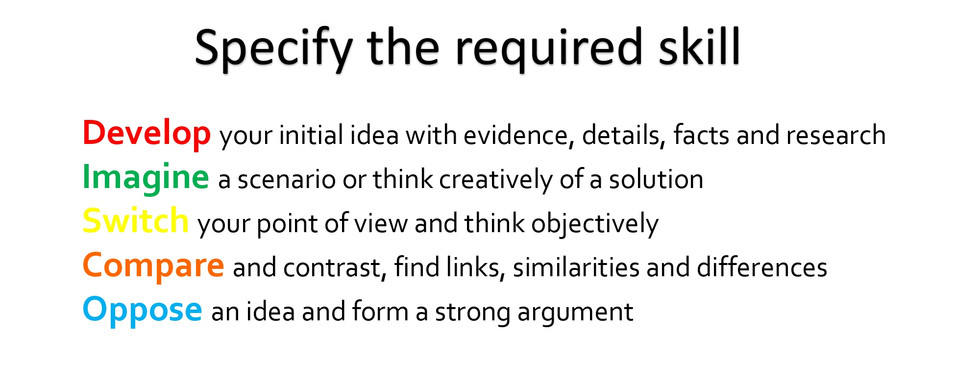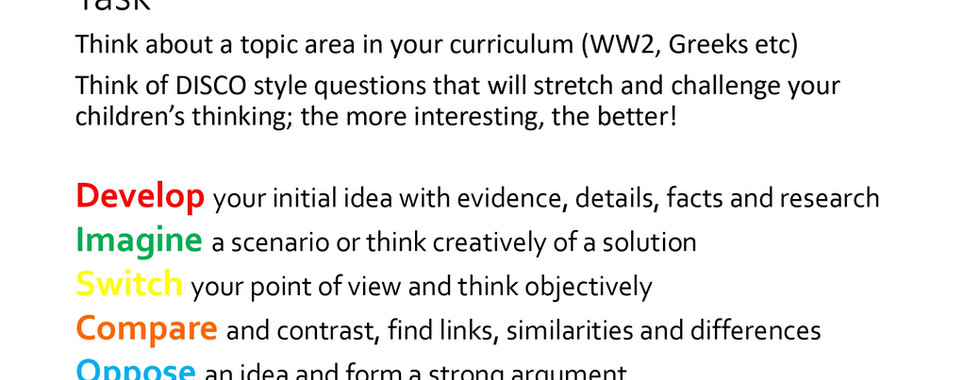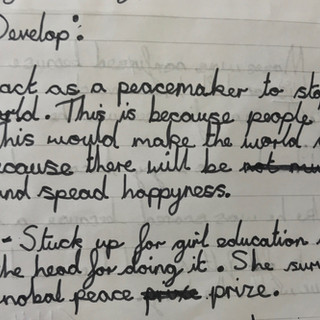D.I.S.C.O. Questions
- Mr D

- Mar 27, 2022
- 3 min read
Welcome to our first guest blog! Behind the many Spurs-obsessed tweets of @SimonGood21, lies a deputy head of a two-form entry Nottingham primary school. In this blog, he talks about the idea of using D.I.S.C.O. questions to support children to think critically. We've teamed up with Simon to put together some resources we hope you'll use and find useful in the classroom. Enjoy!
D.I.S.C.O. Questions by Simon Good
Back in 2019, in a time before masks and social distancing, and when ‘bubbles‘ were only something kids got excited about popping, I was trying to find a way to improve 'Greater Depth' outcomes in our two-form entry school.
Core subjects were looking pretty healthy and heading in the right direction, with the help of a 'mastery maths' approach and shared reading, but what about everything else? What about those often neglected curriculum subjects that are now very much back in the limelight?
The days of overly complicated ‘differentiation’ were thankfully on the way out, and we wanted a way to stretch and challenge the children’s thinking in another way.
I was fortunate enough to hear @carpenter_rob give a talk at a Trust inset event and something he said resonated with me: How can we get the children thinking more critically? This is where true Greater Depth thinking lies.
So, I began dissecting what I understood by critical thinking. I spoke with colleagues within the Trust, plus various educational blogs and ideas before an idea began to emerge.
I knew it had to involve an element of fun and it had to be simple enough to work from EYFS-Year 6. I decided to try and identify the ways of thinking that we could seek to develop.
I played around with lots of possibilities and got well and truly stuck in a swamp of anagrams… but the skills I finally settled on were these:
Imagine scenarios and think creatively; encouraging children to look for alternative answers and express them in more interesting ways.
Compare and contrast different ideas, topics and opinions. Help the children to spot differences and similarities.
Developing an initial idea by adding more detail; teaching children to go further than the superficial and adding real depth to an answer.
Switch their point of view; show children that not everyone shares the same ideas. Teach children to put themselves in someone else’s shoes and see things from another perspective.
And finally to debate or argue effectively; teach children to create strong, persuasive points of view based on facts and research.
So, I had my skills! The next challenge was to make it into something catchy and fun! After some serious countdown style word play - the light bulb eventually flickered to life.

D.I.S.C.O!
Develop, Imagine, Switch, Compare, Oppose
Now I had the hook, I was able to add the finer details. We kick-started the initiative with posters, stickers and the 70s classic hit 'D.I.S.C.O.' by Ottawan blaring around school (I even spotted a conga line at one point).
During the term, these questions soon became embedded and at the end of most Science, RE, Geography and History lessons, a DISCO question would be included. As we have moved on, oracy has become central to our practice and the two go hand-in-hand beautifully - as the nature of the questions often spark instant debate.
There is a a lot of research that looks into whether or not critical thinking can really be taught; I tend to side with the school of thought that you need the knowledge of the subject in order to think critically about it. Therefore, it becomes absolutely essential that we provide the children with that knowledge before expecting them to analyse it and answer in detail about it.
DISCO has provided us with a way of ensuring that we are consistently seeking to challenge and stretch the children’s thinking across the curriculum. It’s simple and it’s fun, which in my opinion is often the key for successful ideas!
Simon Good
Here is the slideshow that Simon presented to Transform Trust!
We loved the idea so much here at Manic Street Teachers, that we've created a FREE pack of D.I.S.C.O. posters that you can download and share with both colleagues and children alike, giving more children the opportunity to think critically about the knowledge that they have. Click the link above or the image below to download your FREE resource!
We have also started to publish a range of whole class reading lessons for UKS2 (with LKS2 on their way soon), featuring D.I.S.C.O. questions at the end of all our lessons. Take a look at some of the D.I.S.C.O. questions we've been producing for our brand new whole class reading lessons below.
Here are some other example answers by Year 5 from this half-term.
Thanks for reading and see you at the D.I.S.C.O. soon!🕺 Matt @ Manic Street Teachers


































































Comments